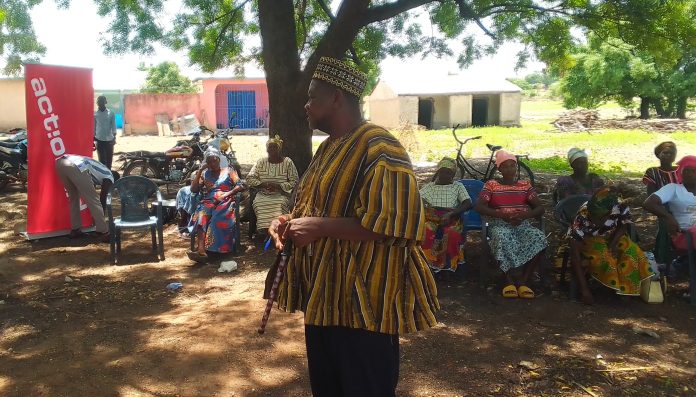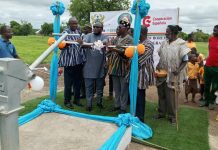During community engagements with two communities in the Ullo traditional area in the Jirapa municipality, it has come out that there is a phenomenal high school dropout rate in schools in that area.
Shocking is the revelation that a school in Ul-dantie, one of the communities, the Islamic Primary School, there isn’t a single pupil in the kindergarten 2 class indicating that there will be no pupils in primary one, come the next academic year, a situation deemed disturbing.
This came to light when the Jirapa Farmers Network (JIFAM) a community based organization in collaboration with Actionaid Ghana, a development oriented Non Governmental Organization (NGO), engaged teachers, community members, opinion leaders, parents and traditional rulers to find out and map strategies to curb the high school dropout rate in that area.
Statistics laid down by the Ghana Education Service’s (GES) officer in charge of supervision in the Ullo area, Edward Zuri, total numbers of school dropouts from the Ul-kpong primary from January to 2025 are as follows: KG 1 – 16; KG 2 – 9; Primary 1 – 12; Primary 2 – 9; Primary 3 – 3; Primary 4 – 1; Primary 5 – 5 and Primary 6 – 2.
Statistics for the same period for the Islamic Primary School, Ul-dantie are: KG 1 – 0; KG 2 HAS NO PUPILS; Primary 1 – 11, Primary 2 – 1; Primary 2 – 1; Primary 3 – 3; Primary 4 – 6; Primary 5 – 5: and Primary 6 – 4.
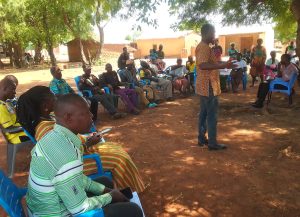
Analysis from almost all contributing stakeholders point out that the high dropout rate in the lower classes, like the kindergarten is that parents engage thes young children as care givers or baby sitters for their younger siblings whilst their mothers go about their daily chores.
For the middle and upper primaries reasons such as domestic and farm chores, lack of parental care and supervision, inadequate school staffing and infrastructure, commercial activities such as “galamsey” and truancy, are some of the known causes of children staying away from school.
One other standout cause of low patronage and dropout in school attendance has been attributed to parents opting for their children to learn trades such as dress making, weaving and sewing of smogs, repairing of motorbikes and cars among others.
This required the counsel of the Upper West Regional Labour Officer, Godwin Fuoh Bibariwiah who was emphatic that Ghana’s laws frown on exposing children to hazardous and exploitative work and working conditions especially when those engagements adversely affect the physical and emotional well being of the child.
He further stated that Ghana’s laws do not permit children under fifteen years of age to undergo any form of apprenticeship or format work and that it is an offense, punishable by law either by imprisonment, payment of a fine or both if parents or guardians are found in violation of this law.
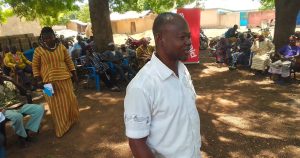
He made it clear however, that children under fifteen years are allowed to undertaker light un-exploitative and hazardous chores termed as child work that does not strain them physically or emotionally or keep them away from school.
He also pointed out that children under thirteen years and above allows children to do what is termed as child work.
Bibariwiah noted that the authorities are not against apprenticeship, saying government is rather for training that would provide young people with ready jobs after school especially in the Information Technology and Oil and Gas sectors that’s why a lot of attention has been turned to Technical and Vocational Training (TVET).
The officer in charge of the Gender Desk at the GES office Sophia Jakpa, said there is an ongoing re-entry programme in schools that opens a window for school children who dropped out of school for various reasons to continue with their education.
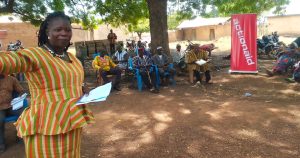
She said for some reasons such as pregnancy, sickness and the like school children have dropped out of school and that the programme has been introduced for children who want to continue to do so.
She however stated that there should be a mark of commitment from the student, the parents and community to support these students who are re-entering for their success.
Lambert Dasien, an officer with Actionaid Ghana and JIFAN, said Actionaid has been working in the municipality to bring about development and reduce poverty by supporting various sectors that affect the livelihood of the people.
He said education is one of the most important areas that brings about development and that it is alarming that children who are the future leaders keep dropping out of school at this rate.
He is urging traditional rulers, opinion leaders, parents and students and most importantly School Management Committees (SMCs), Parent Teacher Associations (PTAs) to take a critical look at this phenomenon for a lasting solution in order to keep the development agenda on track.


